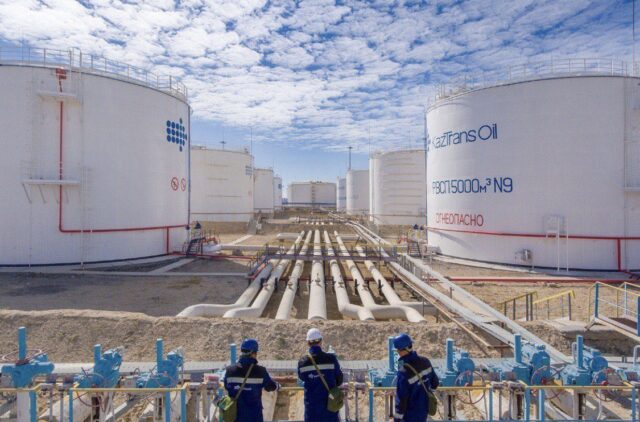
Russia Impedes Kazakhstan’s Efforts to Increase Oil Exports to Germany
Publication: Eurasia Daily Monitor Volume: 21 Issue: 41
By:

Executive Summary:
- Berlin and Astana have been working to increase oil exports from Kazakhstan since the end of 2022 after Western sanctions forced Germany to explore alternatives to Russian energy sources.
- Increasing Kazakh oil exports seems unlikely as shipments would pass through Russia’s Druzhba pipeline and Russian oil company Rosneft has been in a legal battle with the German government since 2022 after the Russian company’s German facilities were placed under a trusteeship.
- Reports suggest that Rosneft will sell its German assets by September 1. The deal may fall through if the German government suspects that Rosneft is attempting to sell its assets through third parties.
On March 5, Kazakhstan’s Energy Minister Almasadam Satkaliyev announced that the country is considering increasing its oil exports to Germany this year to two million tons, 800,000 tons more than initially planned. According to Satkaliyev, a “request from German companies to increase the volume” of exports prompted these talks (Kursiv Media, March 5). The energy minister’s statement, however, was at odds with the situation on the ground. On February 6, Kazakhstan’s state-owned oil and gas company KazMunayGas and German company Rosneft Deutschland extended their 2023 oil export agreement by just six months, with a monthly volume of 100,000 tons (Kmg.kz, February 6). This raised questions about the viability of Satkaliyev’s proposed plan. Additionally, Kazakh oil shipments pass through Russia, meaning that Astana and Berlin’s growing energy cooperation relies on the Kremlin’s willingness to allow the oil to pass through its infrastructure.
Germany turned to Kazakhstan for oil exports at the end of 2022 after Western sanctions forced Berlin to explore alternatives to Russian energy sources. In 2023, Germany, Russia, and Kazakhstan reached a deal to send 1.2 million tons of Kazakh oil to Germany in 2023 to bail out the PCK refinery in Schwedt, which had relied on Russian oil exports (Vlast.kz, January 13, 2023). Kazakhstan has been using the Druzhba pipeline, operated by the Russian company Transneft, to ship its oil through Russia and Belarus to Adamowo-Zastawa in Poland, an intermediary point from where oil exports are forwarded to the Schwedt refinery.
By the end of the year, Kazakhstan had sent 993,000 tons of oil to Germany through this agreement. Exports picked up in the second half of 2023 as Kazakhstan only exported 40,000 tons of oil in the first quarter of the year instead of the originally planned 300,000 (Neftegaz, January 12). As the year went on, it became clear that Astana was exporting oil to Germany based on short-term contracts extended every six months, reflecting the lack of long-term stability. For example, in June 2023, KazMunayGas and Rosneft Deutschland, which owns and operates the PCK refinery, announced a six-month agreement to ship 100,000 tons of Kazakh oil to Germany every month for the remainder of the year (Kmg.kz, June 20, 2023).
Kazakhstan exported 200,000 tons of oil to Germany in the first two months of 2024, with plans to export 1 million more by the end of the year (Forbes.kz, March 6). The two sides cannot commit to a longer or larger deal because the Kremlin can block Kazakh oil shipments via the Druzhba pipeline at any time. The fate of German-Kazakh energy cooperation depends on the outcome of the ongoing legal battle between Rosneft and the German government over the ownership and sale of the Russian energy company’s assets in Germany.
In September 2022, the German government transferred Rosneft’s German subsidiaries, Rosneft Deutschland and RN Refining and Marketing, to the German Federal Network Agency under a six-month trusteeship, which has been extended multiple times. The agency gained control over three oil refineries—PCK, MiRO, and Bayernoil. The German Economic Ministry explained that Rosneft’s German facilities could face closure without the trusteeship, as other companies planned to cut business ties with Rosneft due to sanctions (Neftegaz, September 6, 2022).
In response, Rosneft sued the German government, accusing it of illegally expropriating the company’s assets. In March 2023, the Federal Administrative Court in Leipzig rejected Rosneft’s claims and confirmed the transfer of its subsidiaries to the trusteeship. The court determined that the German Economic Ministry faced “imminent danger” of these subsidiaries failing to contribute to energy supplies and thus was not obliged to hear the companies’ arguments before making its decision (RBC, March 13, 2023). This has allowed German officials to extend the six-month trusteeship several times, with the latest extension set to last until September 2024 (Interfax, March 7).
In February, Berlin considered nationalizing Rosneft’s assets in Germany. More recent reports, however, suggest that Rosneft has reached a deal to sell its assets instead (RBC, March 1). The sale is expected to occur by September 1. The deal may take much longer or even fall through, given that the German government will participate in the process and reserves the right to cancel the deals if it determines that Rosneft is attempting to sell its assets to its affiliates through third parties.
Should Germany nationalize Rosneft’s assets or hinder its sale, Russia will likely respond by blocking Kazakh oil shipments to Germany. Thus, KazMunayGaz’s six-month agreements with Rosneft Deutschland, which follow the six-month trusteeship schedule, provide the company with a brief window of predictability and stability necessary to export its oil supplies. Astana and Berlin may discuss plans to increase export volumes in 2024 and beyond, but their success rests on the outcome of a favorable deal for the sides with conflicting interests.



